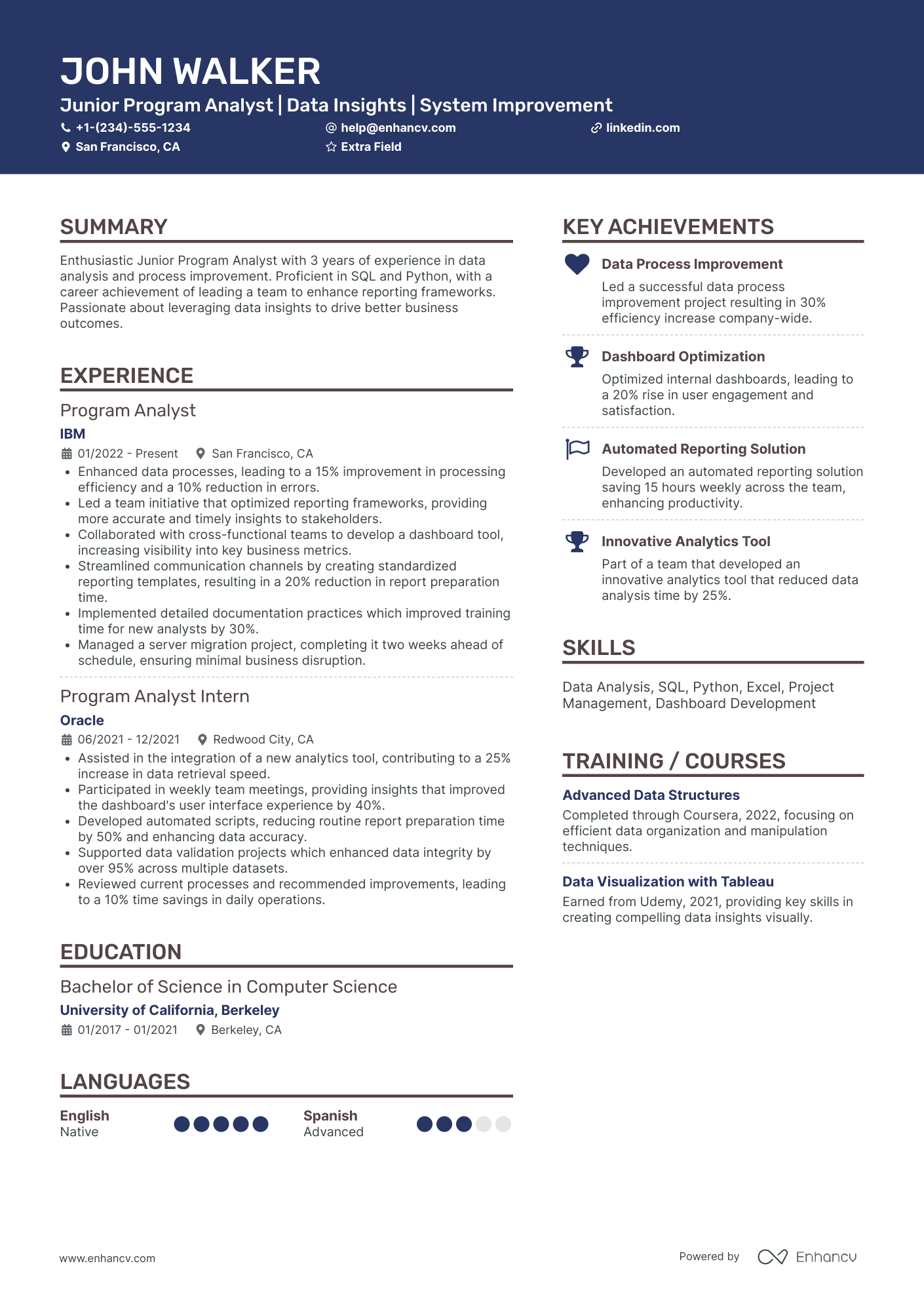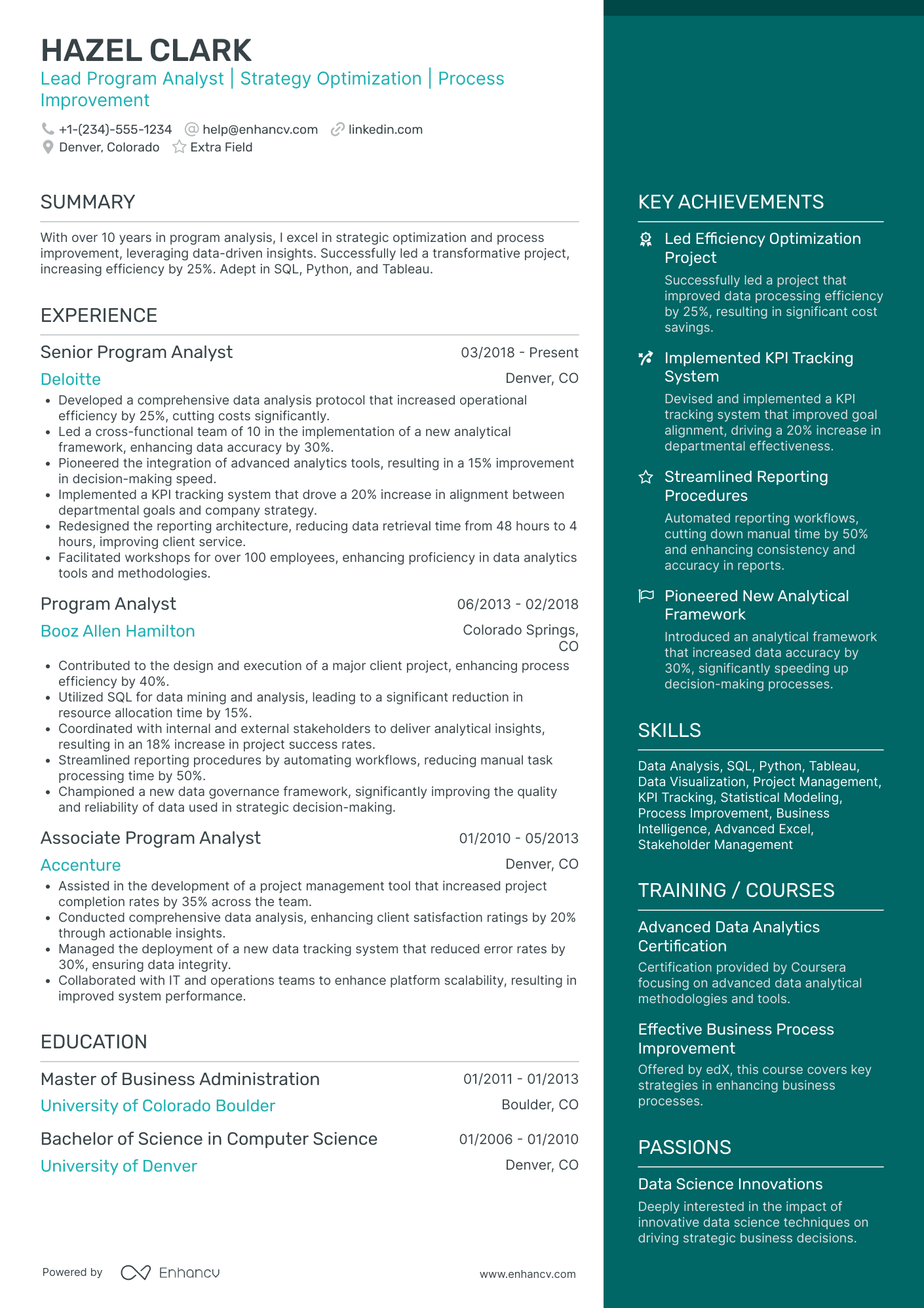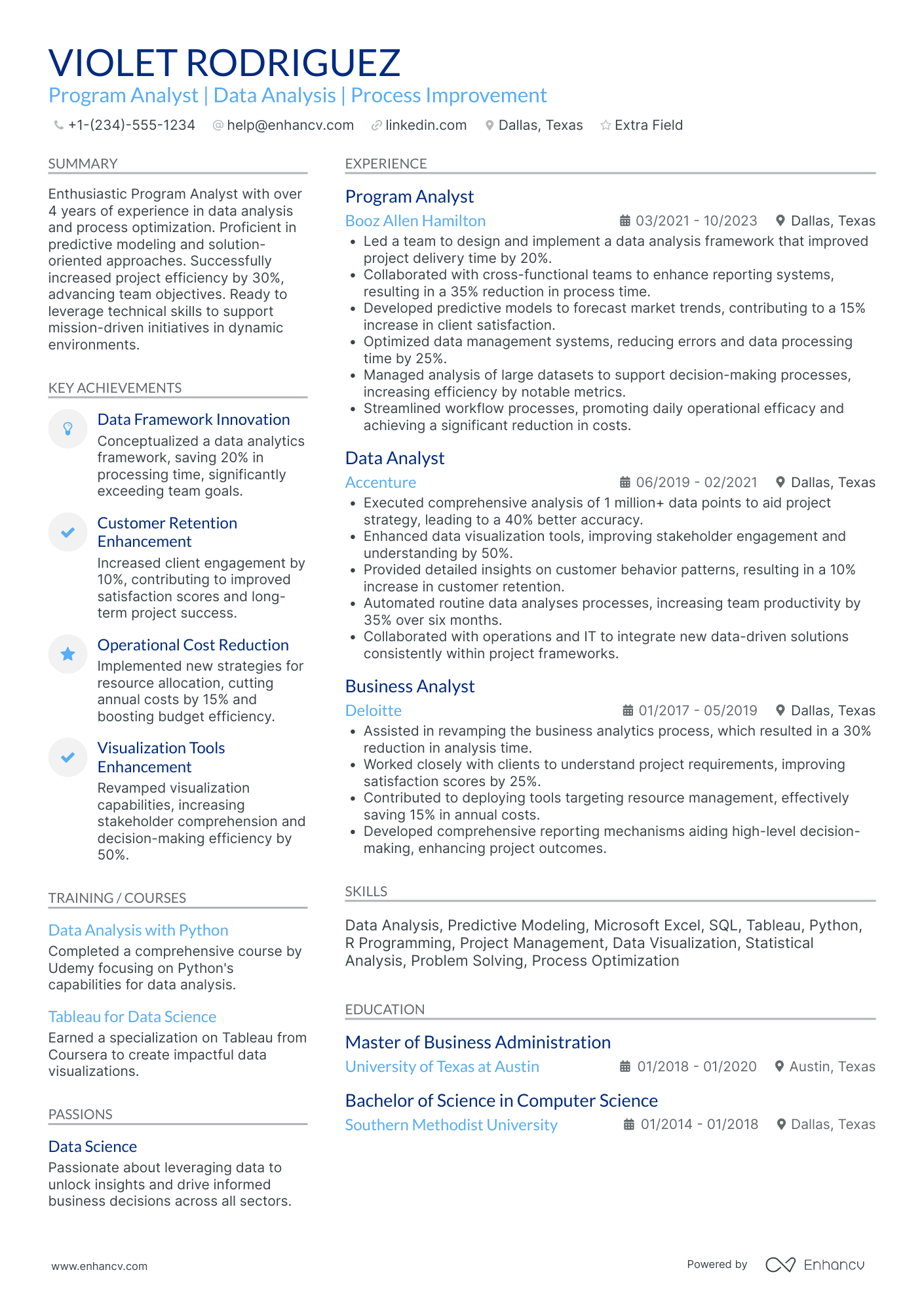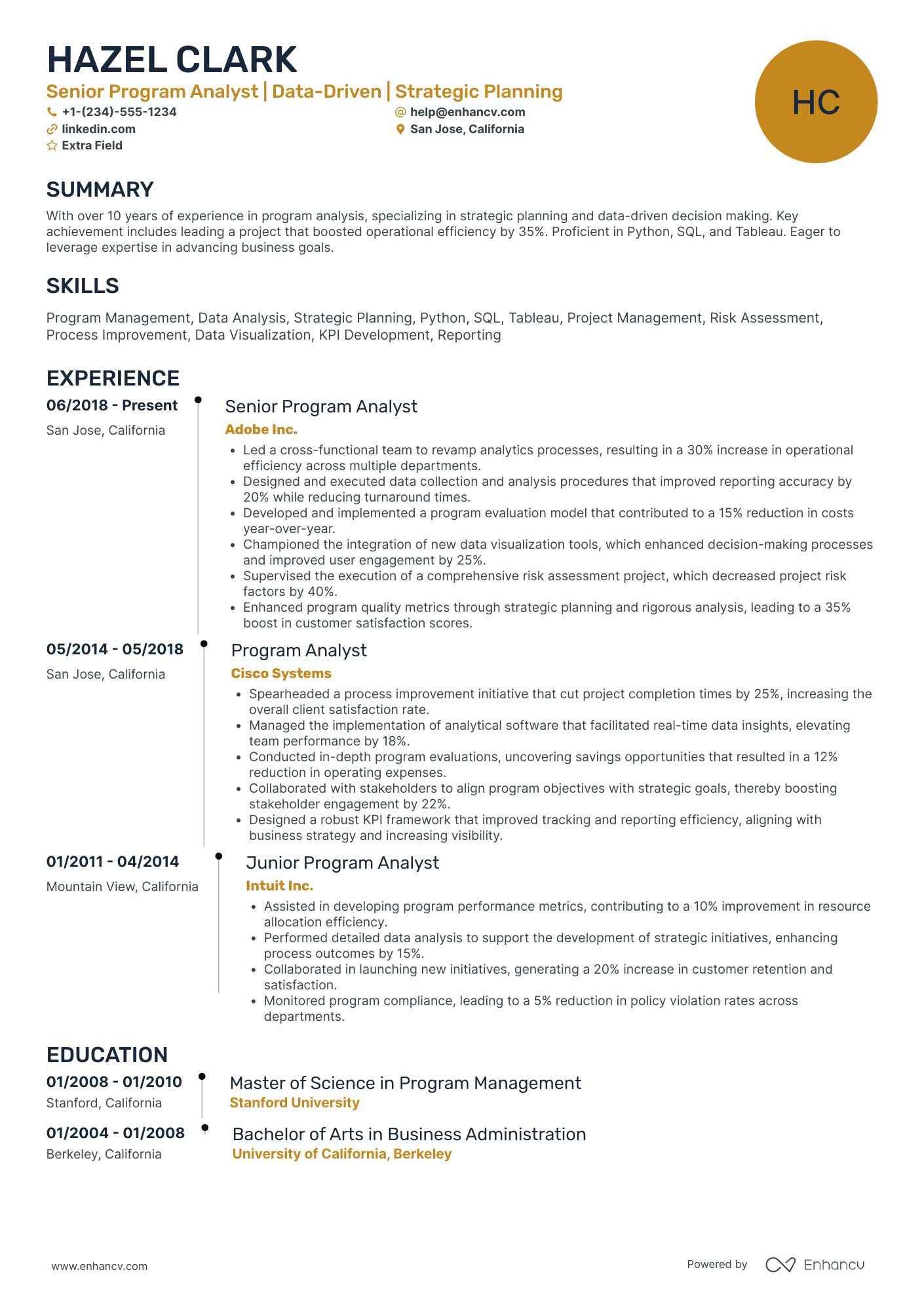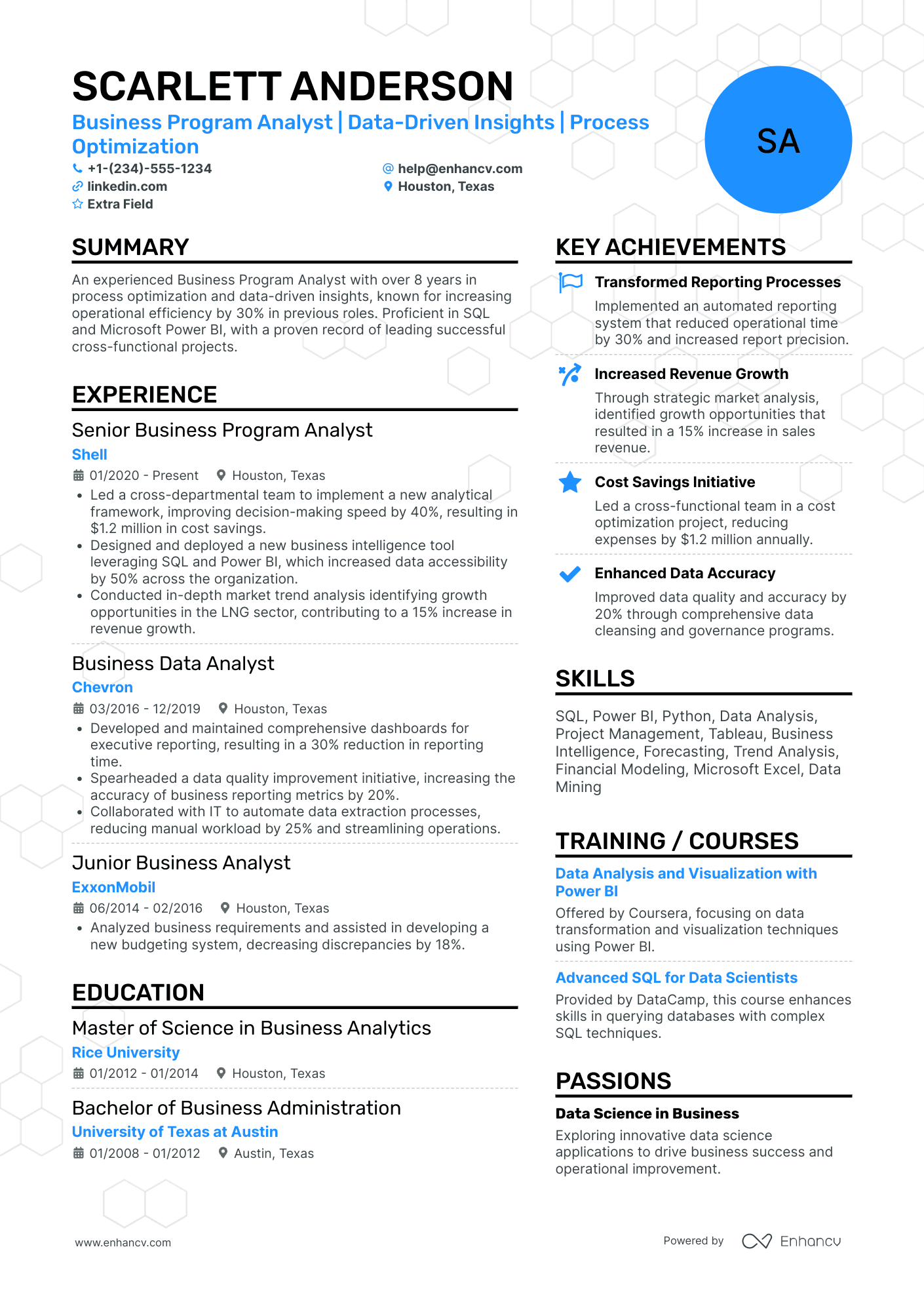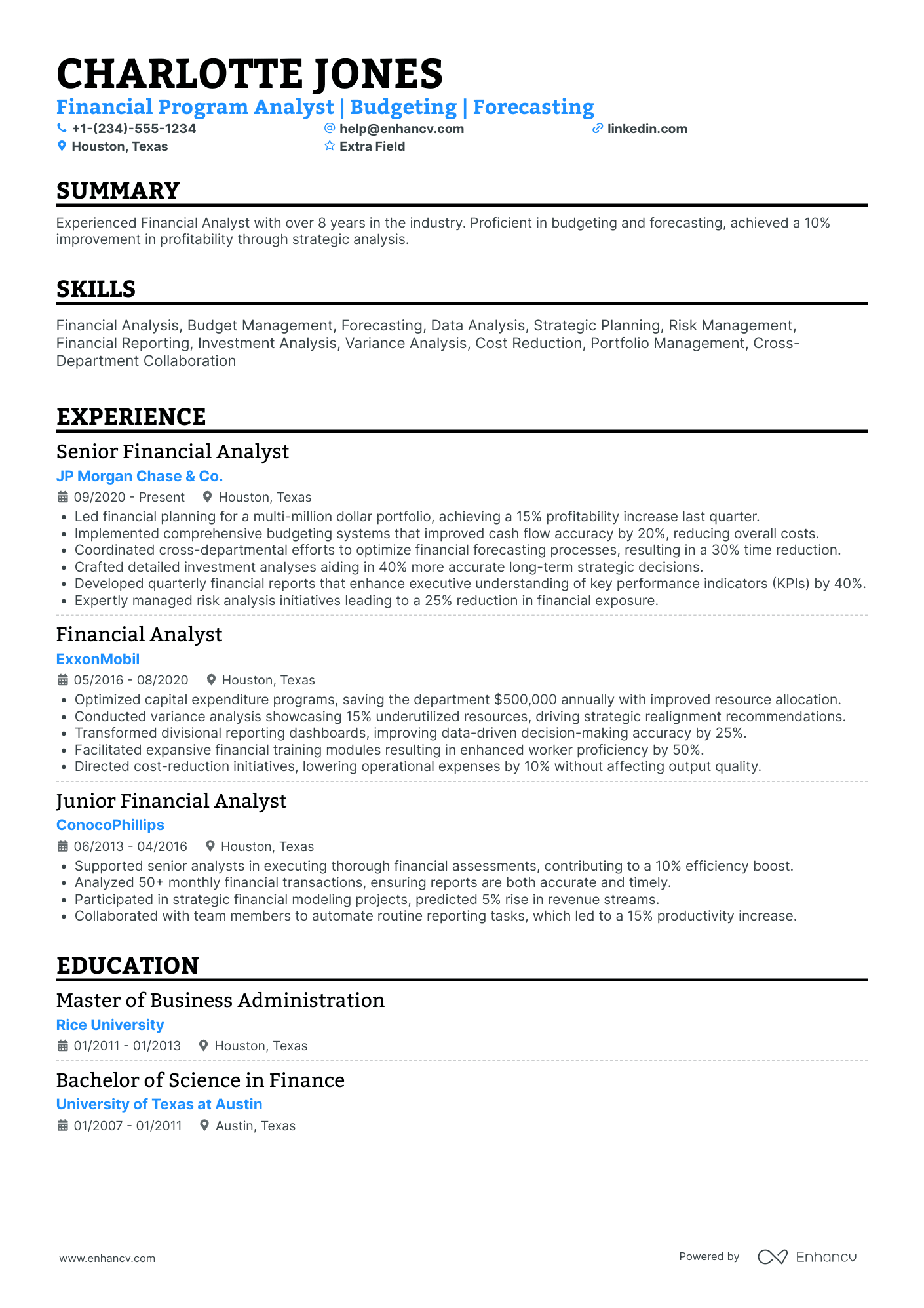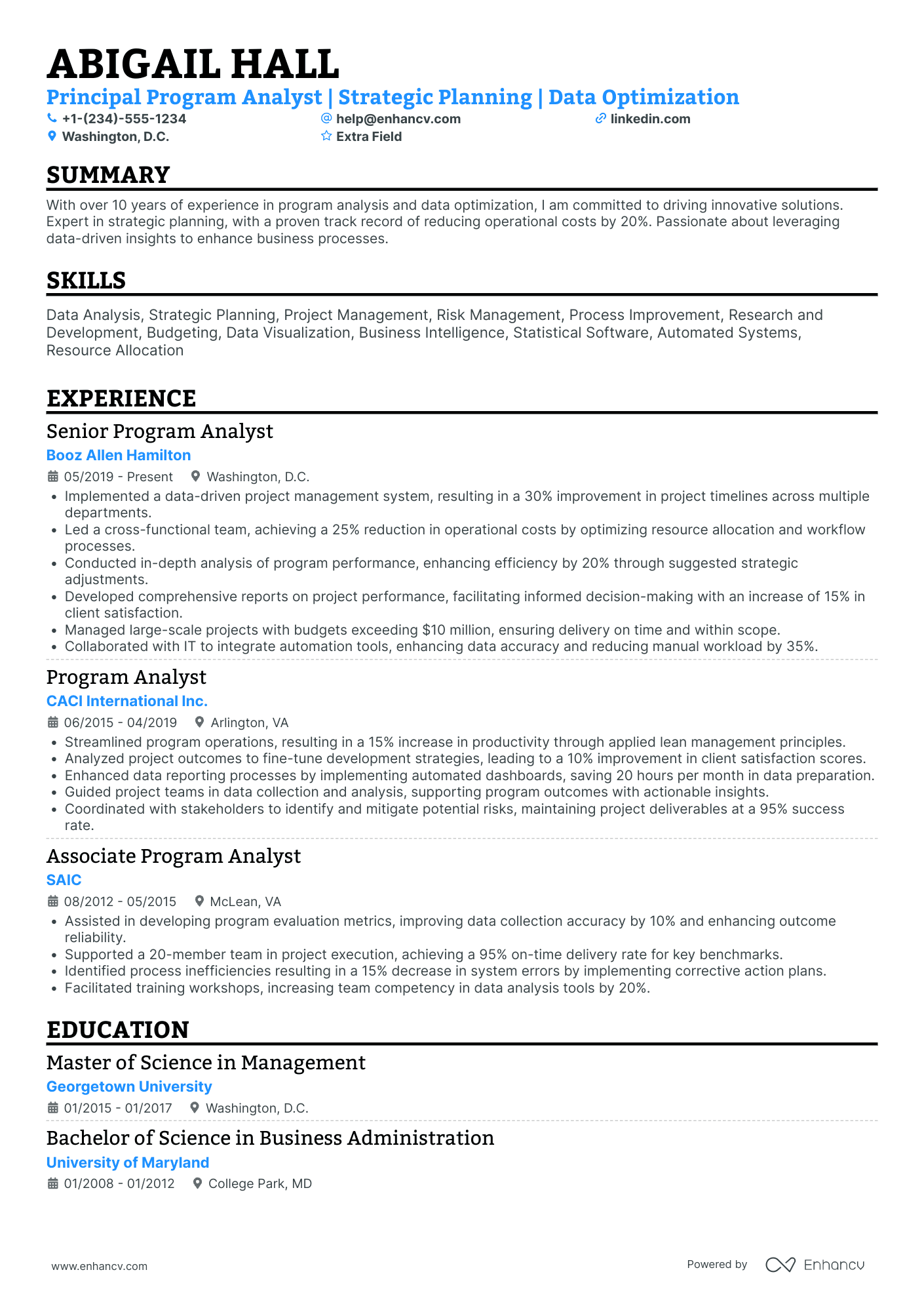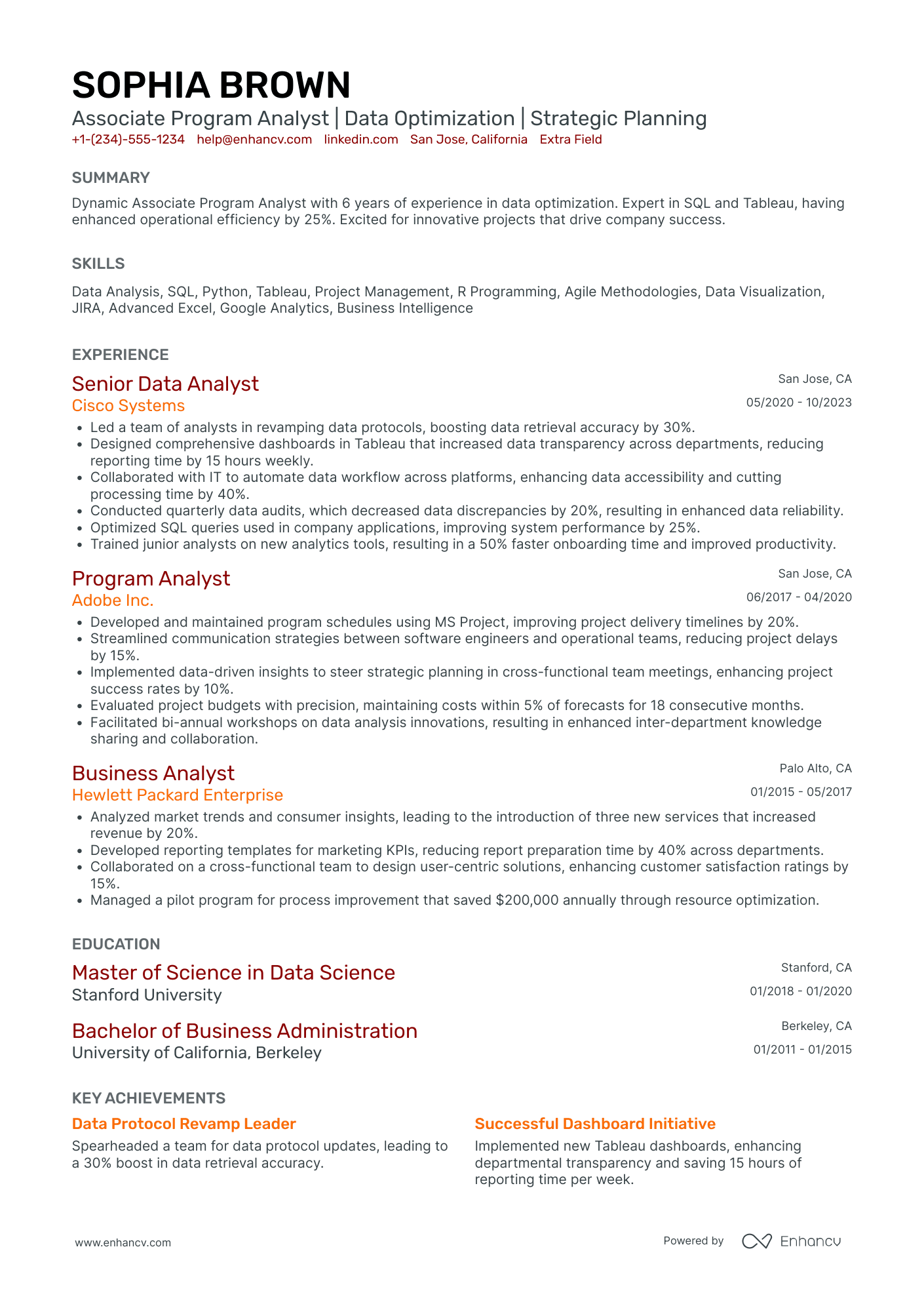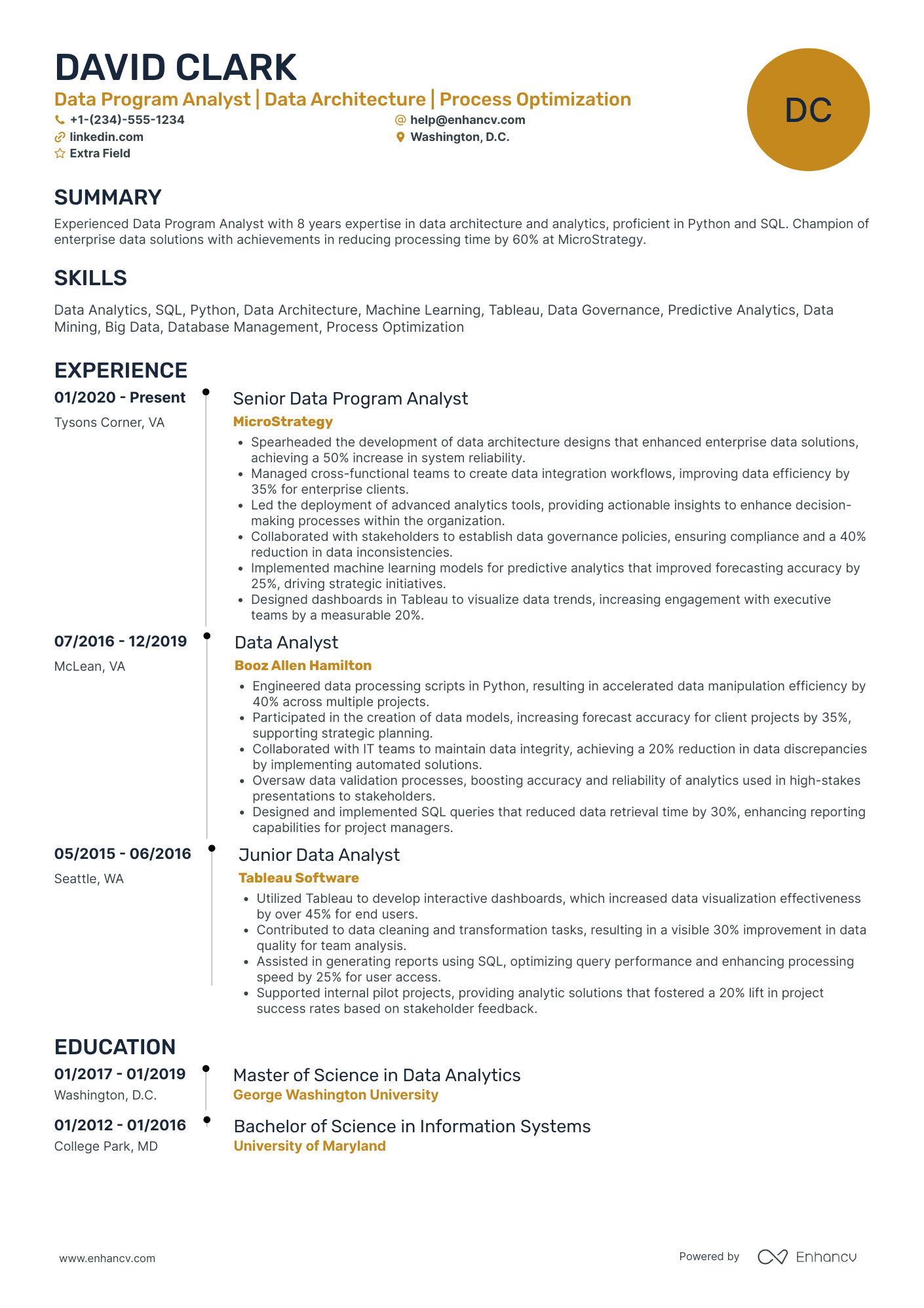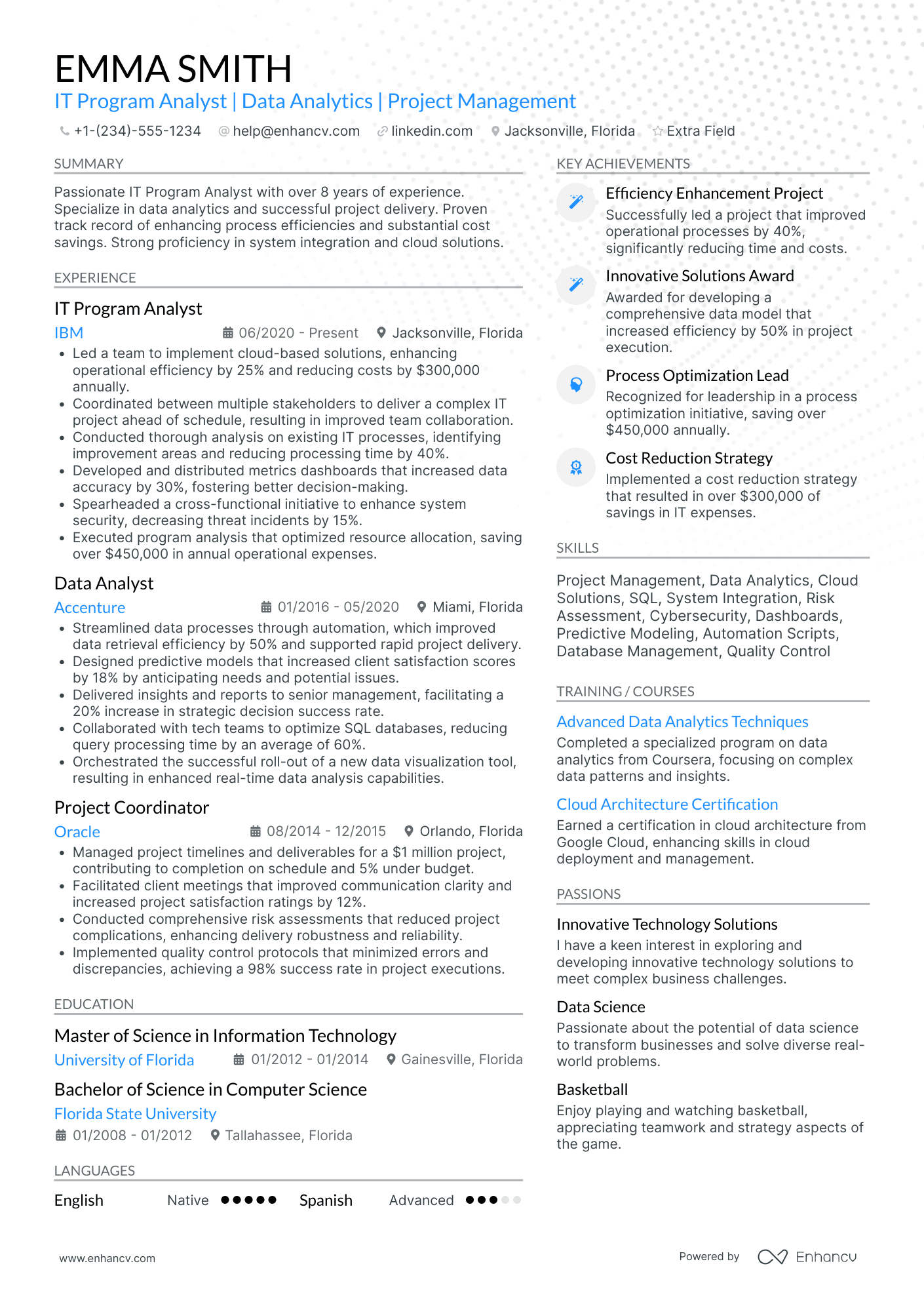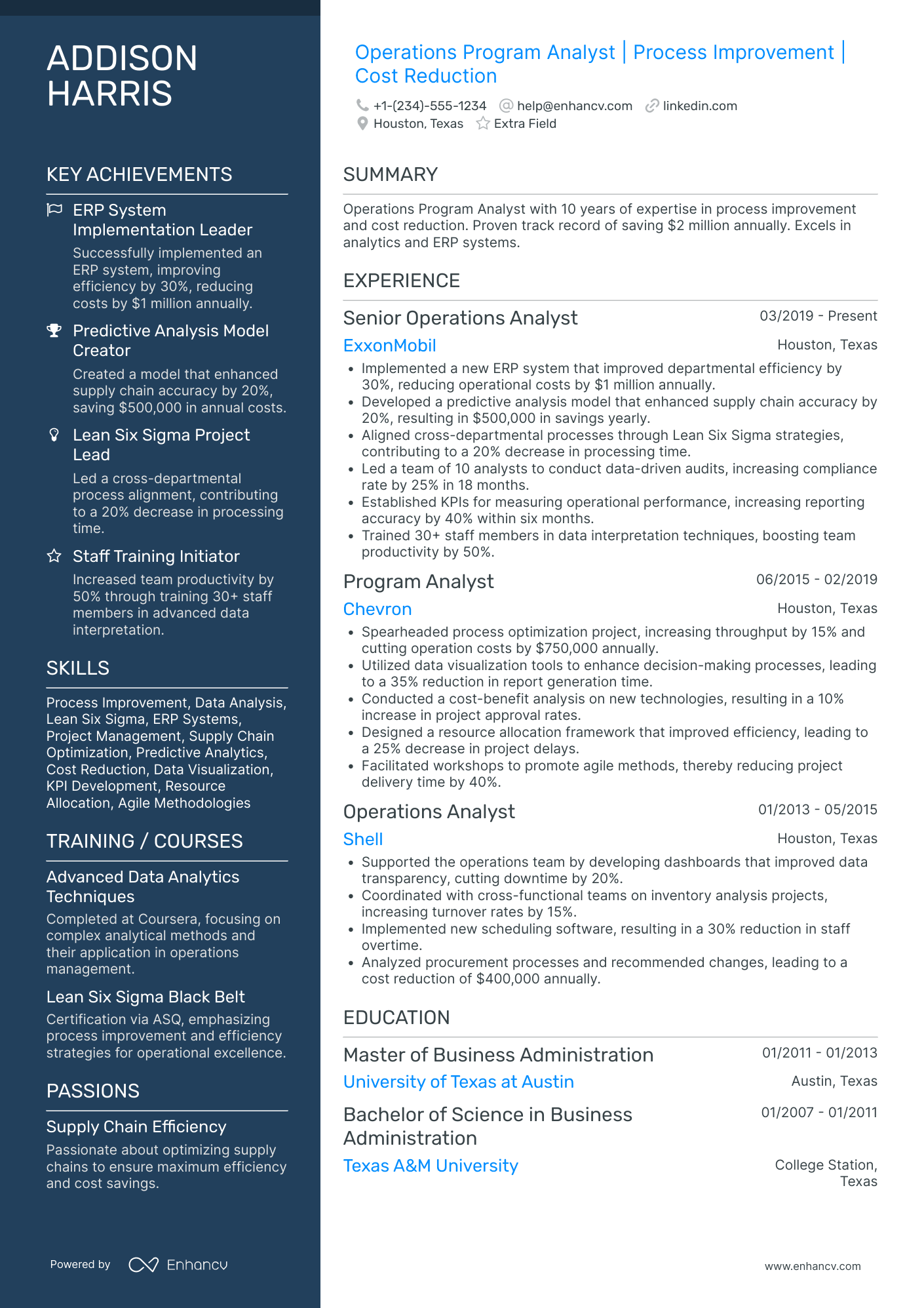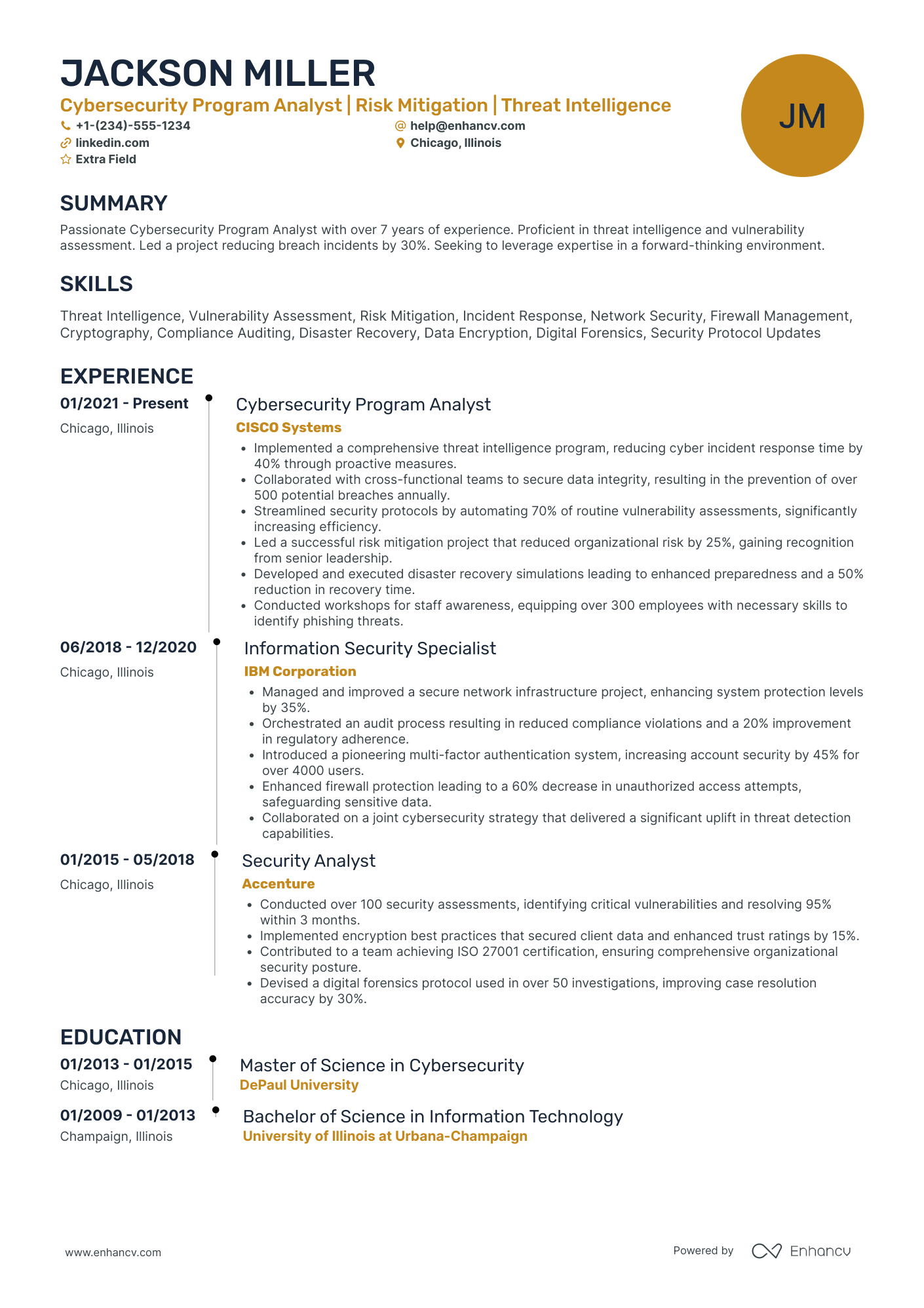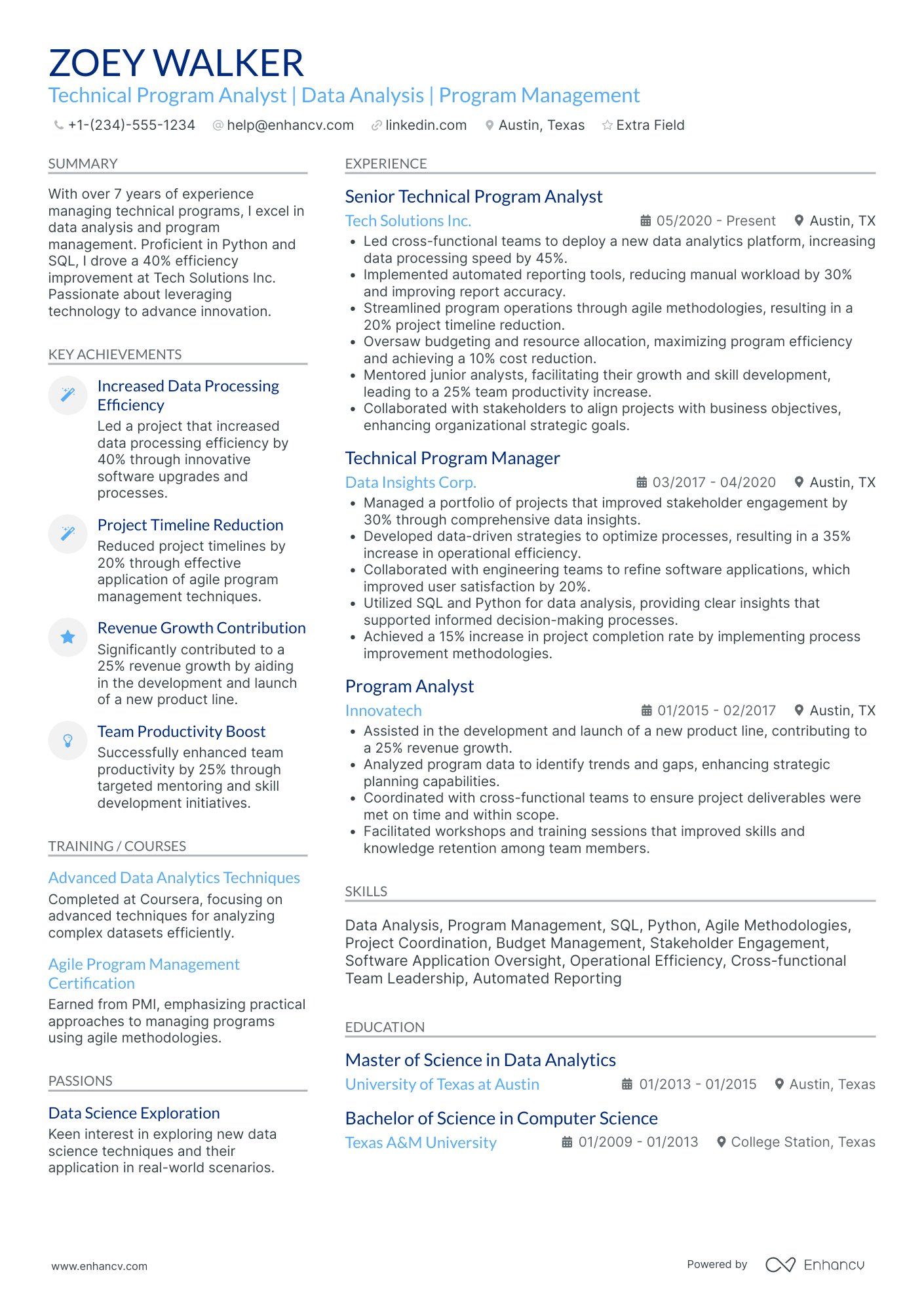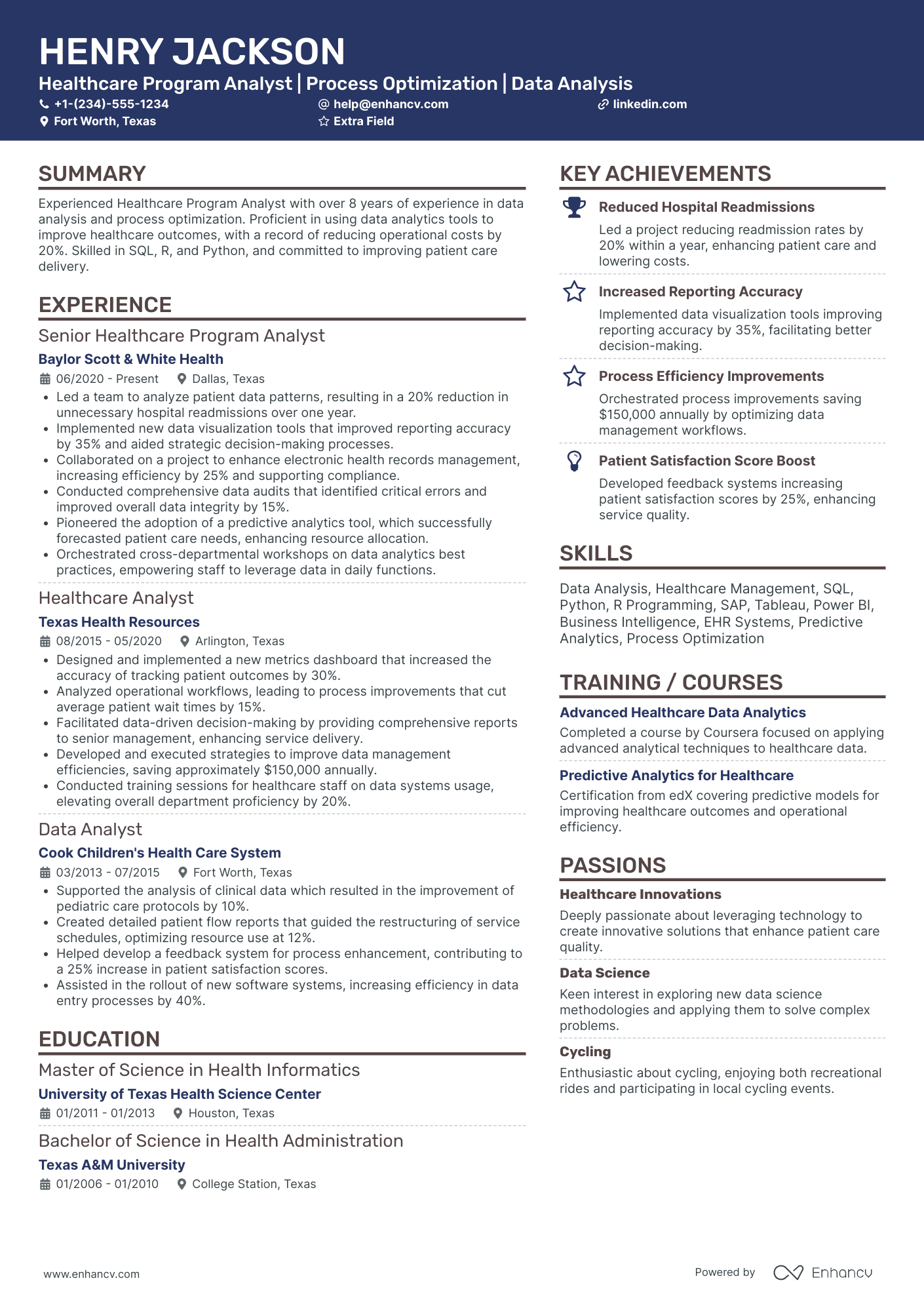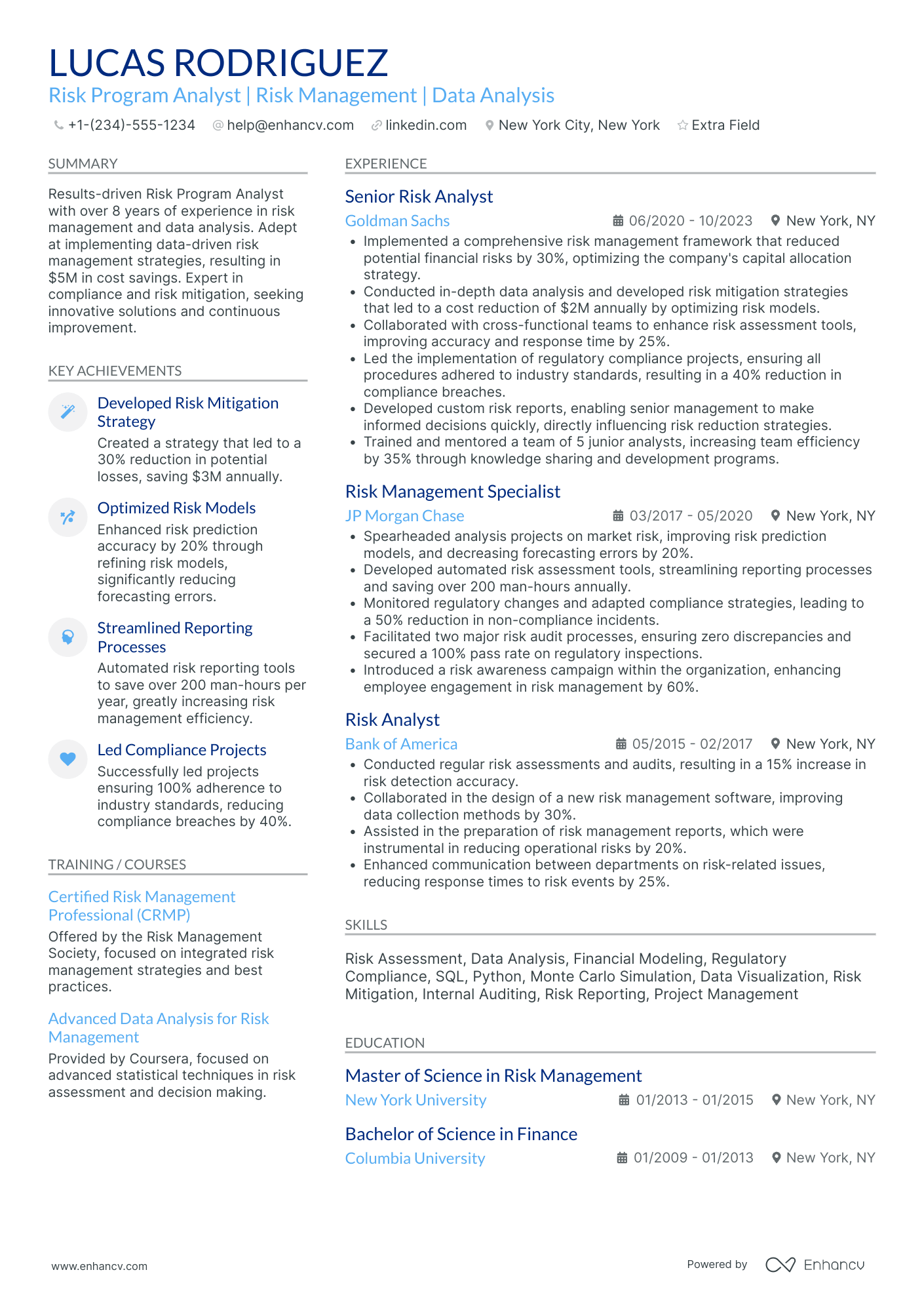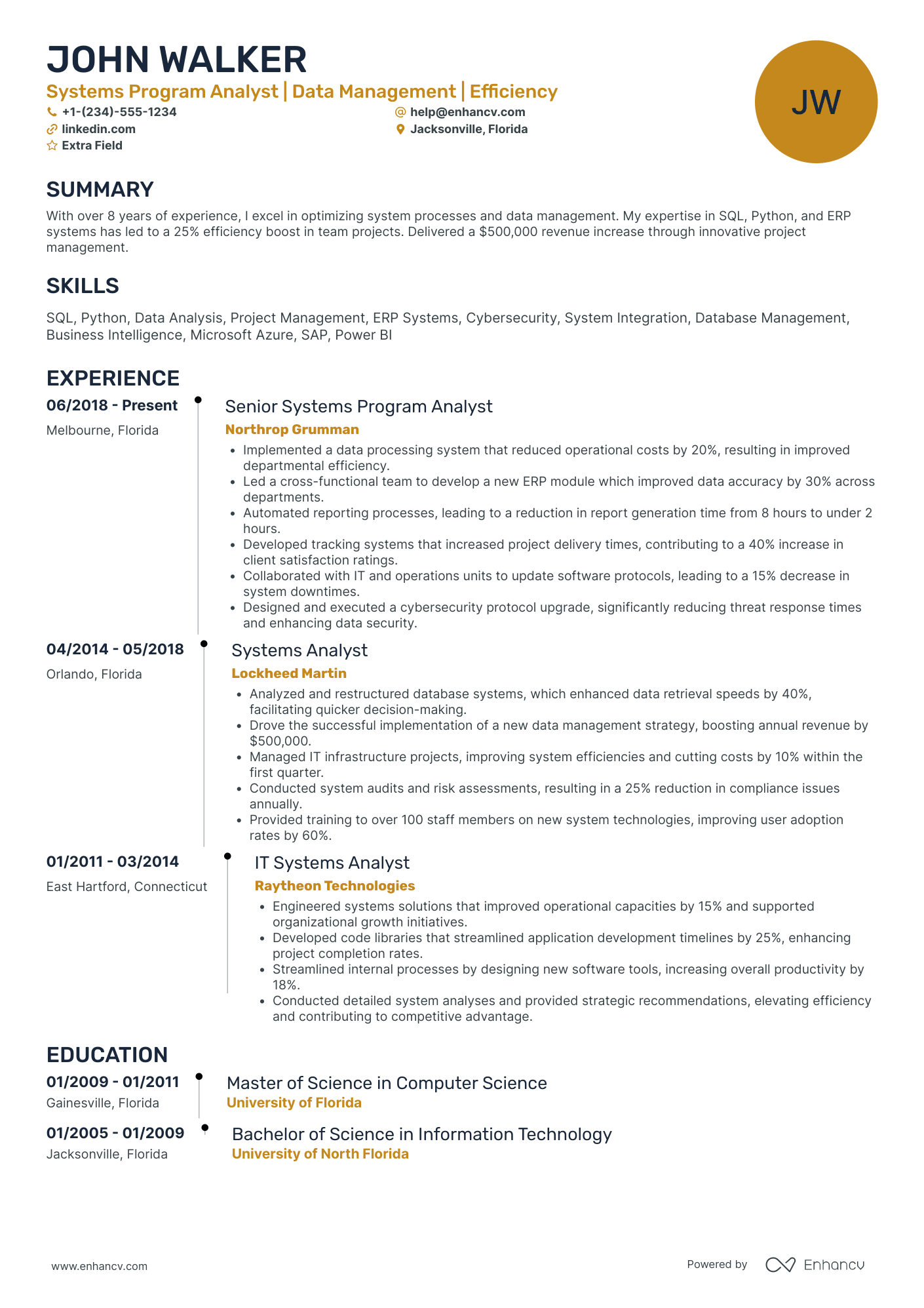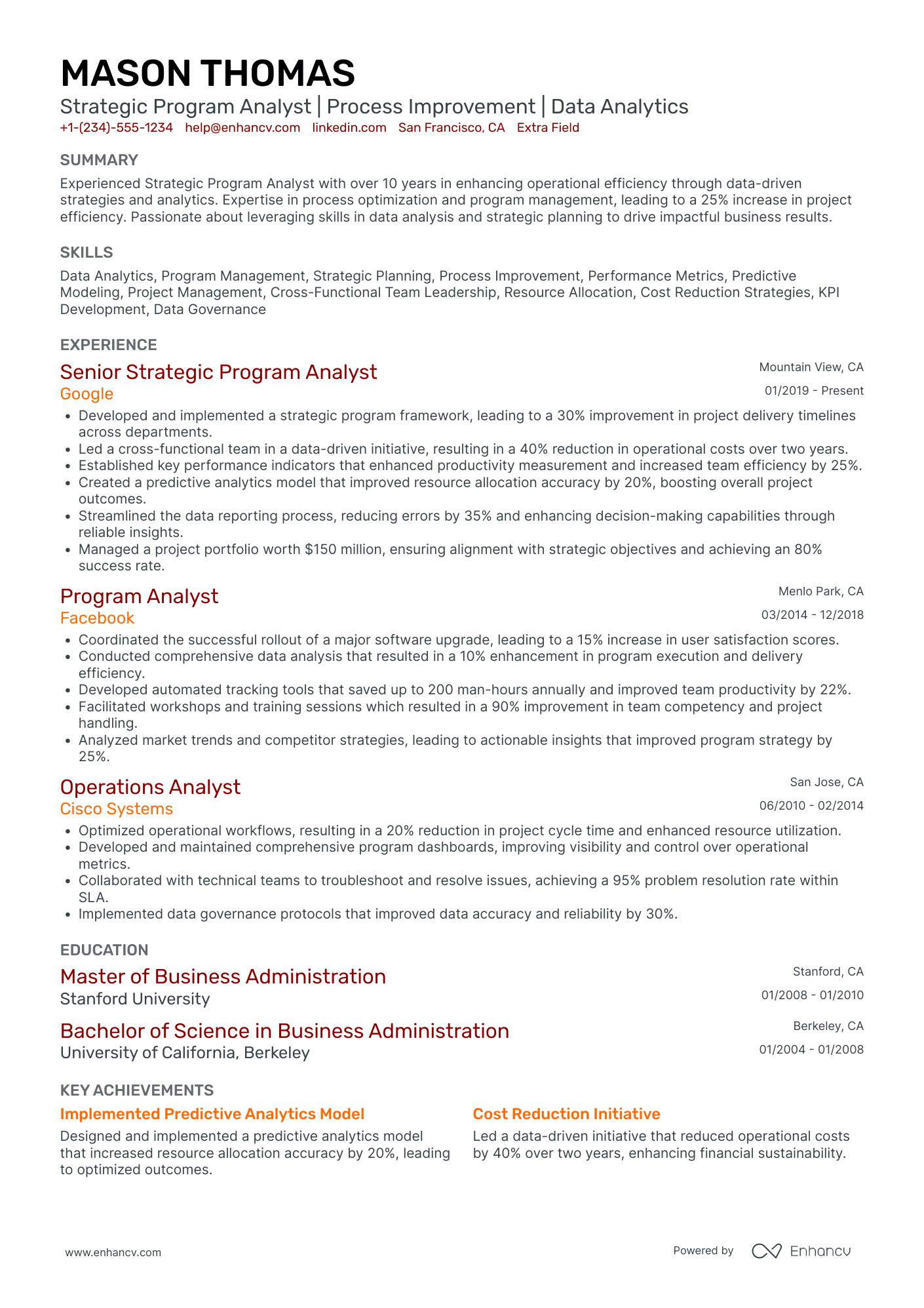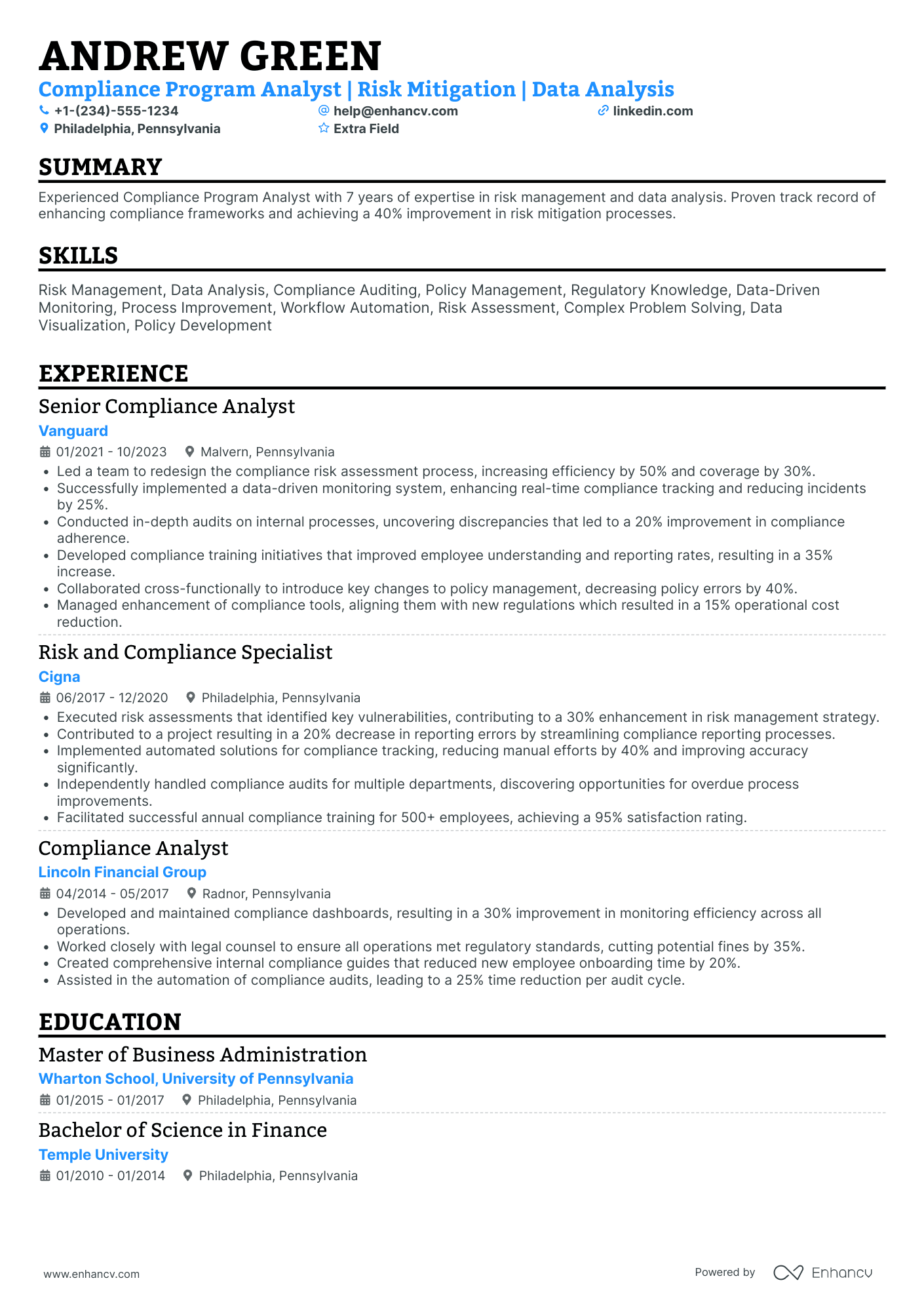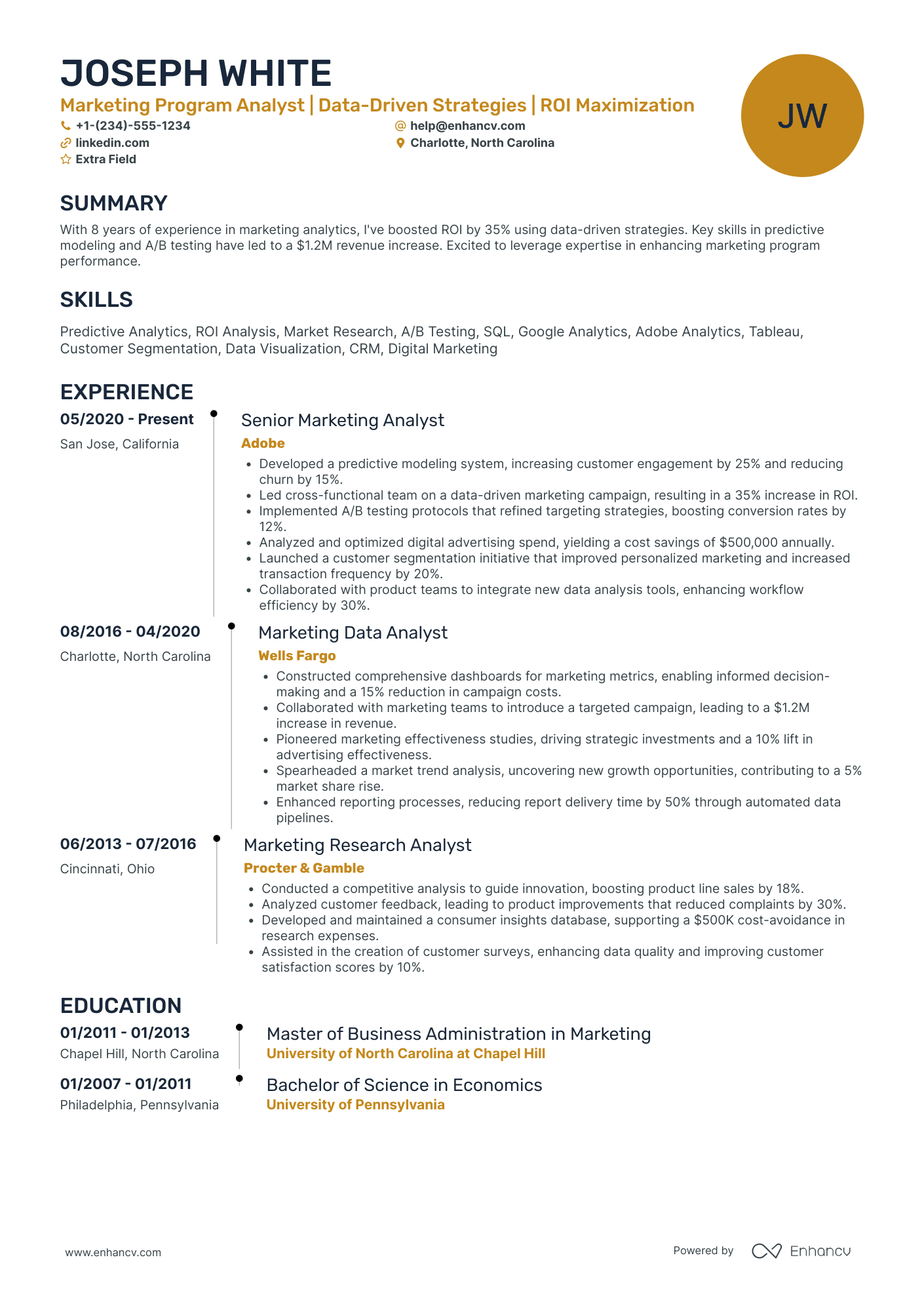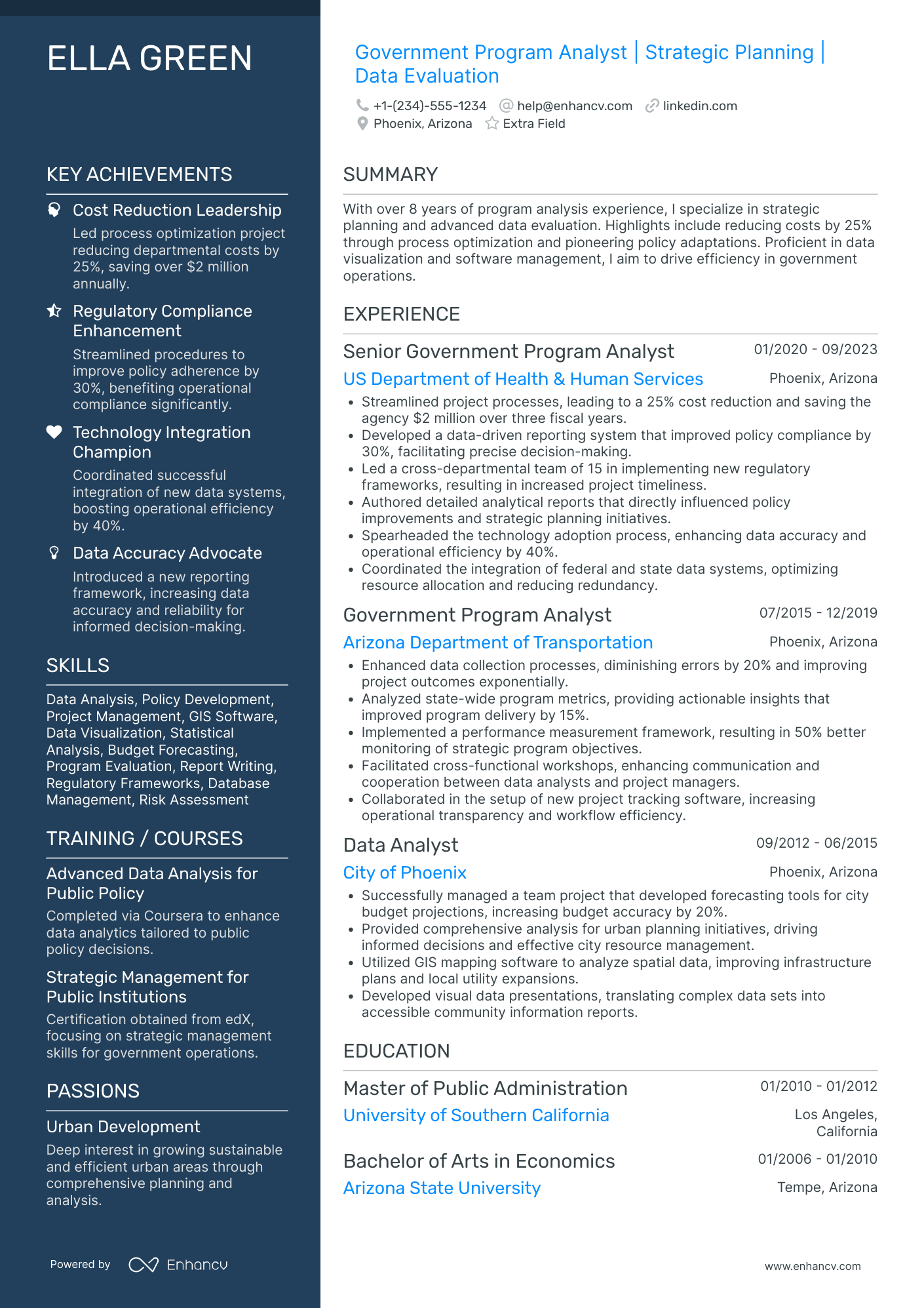As a program analyst you are the brains behind a company’s productivity and success.
You use your analysis expertise and strategic thinking to ensure targets are being met and progress is being made.
Data-minded and results-driven, your reports determine the success and impact of a company.
But how do you show all of this in your program analyst resume?
Don’t worry we have the answers.
When seeking out a program analyst, hiring managers want to know:
- You have the technical know-how (SQL, Quickbooks, Python, Google Analytics)
- You have the right experience
- You have the drive to transform a company
Read on to find out how to instantly make the ‘yes’ pile.
“Developing skills and analytics literacy is critical for success. This is the case for those performing analysis as well as those using the results of analysis as part of an operational business process.”
- Fern Halper, Ph.D., VP and senior research director, advanced analytics at TDWI Research
This program analyst resume guide will include:
- 8+ samples and examples of program analysis resumes
- How to write an impactful summary that will turn heads
- Experiences you need to include to make you unique
- Technical skills you need to acquire to get hired
- The soft skills you should include to prove your suitability
- Program analyst qualifications and certifications
Your goal is to get the reviewer to:
- Read your whole resume
- Be intrigued
- Put on you on the ‘yes’ pile
- Get in touch for an interview
- Hire you
Looking for related resumes?
- Business Analyst Resume Example
- Program Manager Resume Example
- Project Manager Resume Example
- Assistant Manager Resume Example
- Data Analyst Entry Level Resume Example
How to write a program analyst resume
As a program analyst, your role is to optimise a company’s operations, they look to you to keep the wheels moving. You identify issues and provide solutions.
Winning program analyst resumes prioritise data analysis and strategic thinking. Excellent interpersonal and communication skills are also required.
Use your resume to show how you can maximise profit margins, and recommend organisational changes.
Include examples that show you can:
- Collect, manipulate, analyse and report on complex data
- Create new operation strategies to ensure long-term growth
Here's what a hiring manager will look for in your resume.
- Do you have experience in developing new operation strategies?
- Do you have excellent writing skills for report writing?
- Can you analyse and interpret data?
- Are you a highly skilled communicator?
The most important aspects of a program analyst resume:
- Resume header that conveys your professionalism
- Resume summary that sets you apart from other candidates
- Resume experience that proves your expertise
- Hard skills that show your ability to analyse and problem solve
- Soft skills that show your ability to effectively communicate and manage
- Program analyst education and certifications
How to create a striking program analyst resume header
Your program analyst resume header is your introduction to the hiring manager. Let them know who you are and let them know confidently.
You’re applying to work as a senior program analyst for multimedia messaging app.
Your header looks like this:
This doesn’t quite work. Here’s why:
- It’s missing important details. The recruiter wants to know who you are immediately
- It lacks professional links that give the recruiter a better picture of who you are
Make your first meeting one that lasts. Let’s look below:
This is instantly improved:
- Straight away the recruiter can see your seniority level and that you also specialise in management
- It specifies you are a contractor
- It links a professional website that showcases your portfolio and previous achievements.
Now, how to wow visually?
How to choose the right layout your program analyst resume
When choosing the layout for your program analyst resume prioritise readability. Style should not dominate or distract from the content. Be careful how you format your resume.
That being said, why not use some bold geometric shapes to highlight specific sections, or use an interesting colour scheme?
Think outside the box.
Below are some layouts hiring managers won’t forget:
3 ideas to make your resume design memorable
- Use horizontal orientation to create a balanced and organized layout
- Effectively use space with a chessboard-style layout to give your layout a visual edge
- For a clean visual, use a single block of colour on the left-hand side as a divider
Employers don’t want a boring drone in the office. You can use your layout to showcase elements of your personality, and symbolise your thought processes.
Showing you are data-minded and results-driven is essential on a Project Analyst Resume
Managers rely on you to improve the functionality and profitability of their company. To do this they need to know you can handle and interpret complex data and increase revenue.
Use your resume to show the hiring manager that can get results. Provide numbers, facts and figures.
In your resume you can do this by:
- Describing how you analysed a company’s financial spending and mapped out trends
- Explain the effect of your analysis. What did it lead to? Did you minimise spending?
- Writing about how you facilitated organisational expansion
- What did you use to facilitate this expansion?
- How much did the organisation expand by?
Discuss how you built and sustained effective relationships with stakeholders and internal staff. Explain how this ensured needs were being met, and targets were being hit
Describe these achievements and successes in your summary and experience sections.
We’ll walk you through that now.
Writing a comprehensive program analyst resume summary
Your professional summary is an essential part of your resume. It can make or break an application.
Use this space to write about your qualifications and achievements. You are a program analyst mastermind. This is the place where it’s okay to brag.
In a few sentences describe who you are, what you do, how you do it and how long you have been doing it for.
Optimize your resume summary and objective for ATS
Drop your resume here or choose a file.
PDF & DOCX only. Max 2MB file size.
3 program analyst Resume Samples - Summary
Here are some samples of program analyst resume summary sections:
This summary doesn’t say ‘hire me,’ it says, ‘I can’t be bothered’. Here’s why:
- It shows a lack of effort, and a lack of detail.
- First person pronouns come off as childish and unprofessional
- It doesn’t show results, program analysts are data-driven, numbers people, make sure you show this
Instead, expand on who you are and what you have achieved:
This is a huge improvement because:
- It specifies how many years’ experience you have in the role
- It explains what you specialise in
- It discusses your analysis skills
- It shows results. Results are important.
Let’s try this again but for more senior program analyst:
This summary is OKAY but there’s still a way to go. Here’s why:
- It doesn’t note how many years’ experience this ‘qualified’ management program analyst has and appears too vague.
- While it references the candidate’s involvement in delivering long-term strategies, it lacks specifics.
- It appears passive and lacks vigor.
This summary section alternatively corrects all of these mistakes:
This summary is much better. This is because:
- It specifies years of experience and expertise
- It states the candidate’s certifications
- It backs up claims with impressive figures
Pro tip
Use this section as an introduction to your experience section, where you can elaborate further on your achievements. This part acts as a preview, the next section should go into detail about your contributions tospecific companies.
How to frame your experience on your program analyst resume
In your experience section on your program analyst resume, you should emphasise:
- Your experience with specialist software (project management software, budgeting software)
- Your experience analysing and reporting on internal operations
- Your experience of taking ownership and collaborating
And remember, use your words. Don’t just list your experience. A great program analyst is an excellent written communicator.
Show the hiring manager that you are wordsmith, able of creating concise and informative copy.
If you’re struggling with how to format this section, divide it up into bitesize sections. Tell the hiring manager:
- What you’ve accomplished
- How you did this, what you used to do this
- The results it produced
- How you impacted the company
Try to be as informative and accurate as possible.
Below are some examples, try and spot the differences:
2 program analyst resume experience samples
- •Collected and analysed data
- •Reported on analysis conclusions.
- •Worked with project managers to develop systems solutions.
- •Collaborated with the investment team to manage partnership programs.
Those entries won’t instill confidence in the hiring manager. This is why:
- They provide basic information with little insight into your role
- They don’t explain your impact on the company
- They don’t elaborate on the skill set you mentioned in your summary
This following example provides a better explanation of what you can do and how you can do it:
- •Conducted multifaceted analytical projects, using revenue, product and marketing data to establish insight into program developments and solutions.
- •Used industry best practices (ITIL, PMI, and CMMI) to improve proposal operaions.
- •Liaised and collaborated with Product Marketing, Finance and Engineering teams to ensure the optimisation of our investment arrangements.
- •Managed relational databases and operation systems and provided briefings on required adjustments for increased operational efficiency. The required adjustments increased operational efficiency by 49%.
This is much better. This is because:
- It explains how you impacted the company
- It shows the varied nature of your role
- It shows your awareness and implementation of industry best practices
One thing to remember when writing this section is to adapt it each time you apply to a different company.
If you are applying for a data program analyst job, focus on how you worked on data insight, utilising tools such as Tableau, Business Objects and GCP.
Alternatively, if you are applying for a project/program analyst job, emphasise your experience in monitoring brand strength. Explain your experience in creating new operation strategies in response.
How to describe the duties of a program analyst
Below are some of the responsibilities that program analysts have in their day-to-day. It is essential that you reference these duties into your experience, education and skills sections:
- Analysed internal processes, data and problems and identified the benefits of enabling new capabilities and solutions
- Performed cost benefit analysis, risk analysis and gap analysis
- Reported on analysis findings and provided forecasts for long-term growth
- Collaborated with managers to ensure the correct implementation of new procedures
If you have employment gaps or just want to enhance your resume, you can:
- Discuss how you maximised profit and increased the client base with your support
- Go into detail about how you use Google Analytics, BigQuery and Asana to analyse data and manage workflow
- Explain how you provided technical insight to drive decision making
- Note your knowledge of industry best practices (ITIL, CMMI, PMI)
What to include in your program analyst education section?
Your education section is your chance to show the hiring manager that you are qualified and know what you’re doing.
For this position, an analytical BA/BSC degree is usually required as a minimum. Related degrees include, business, computer science, accounting, mathematics, engineering, and business administration.
A masters can also set you apart from other candidates, such as an MBA (Master of Business Administration).
In this section you can also include any certifications you have gained or are in the process of attaining.
Skills to highlight in your program analyst resume
“There is a constant flow of new technologies and tools, and although it's impossible to be an expert in all of them, it's good to be aware of what the technologies are and how they add value.”
- David Loshin, Data Quality Consultant and President ofKnowledge Integrity Inc
Your skills section should show that you are a well-rounded individual.
Make sure you match the keywords, software and programs that are included in the job description.
Here are some of the top program analyst hard skills that hiring managers are looking for:
15 "hard" skills you need to list in your program analyst
- Trello
- Micro Office Suite
- Quickbooks
- ProWorkFlow
- Scoro
- Float
- Netsuite
- Asana
- SQL
- Python/R
- BigQuery
- XML
- Javascript
- Excel VBA
- Google Analytics
Soft skills also show your ability to liaise and manage. These include the following:
9 top soft skills for a project analyst
- Strong Communication skills
- Presentation skills
- Report writing skills
- Analytical thinking
- Time management
- Organisation
- Strategic thinking
- Team management skills
- Presentation skills
Expand on these skills in your experience section and apply them to real life situations.
How to include your certifications on your resume
Including relevant certifications is another way to enhance your program analyst resume.
While program analysts usually receive a level of training in the role, certifications show that you have the ability and confidence to transform a company’s performance.
Certifications also show that you have expertise in a particular area.
Below are some relevant certifications for program analysts.
Top 8 program analyst certifications worth including
- Program Management Professional (PgMP)
- CompTIA Project+
- Certified Management Consultant (CMC)
- Management and Program Analysis Certificate Program: Level One
- Professional Certificate in Data Analysis
- Tableau Desktop Certified Professional
- Tableau Server Certified Professional
- SQL Certification
What to take away from this guide:
When writing your program analyst resume remember the following things:
- Craft a header and summary that portrays you as an analysis mastermind
- Write work experience that is results and data driven
- Showcase your experience with budgeting and program management software
- Reference your soft skills. Show that you are a team leader, and a highly skilled communicator
- Use keywords from the job description throughout your resume, especially in your summary
Program Analyst resume examples
By Experience
Junior Program Analyst
Lead Program Analyst
Entry-Level Program Analyst
Senior Program Analyst
By Role
